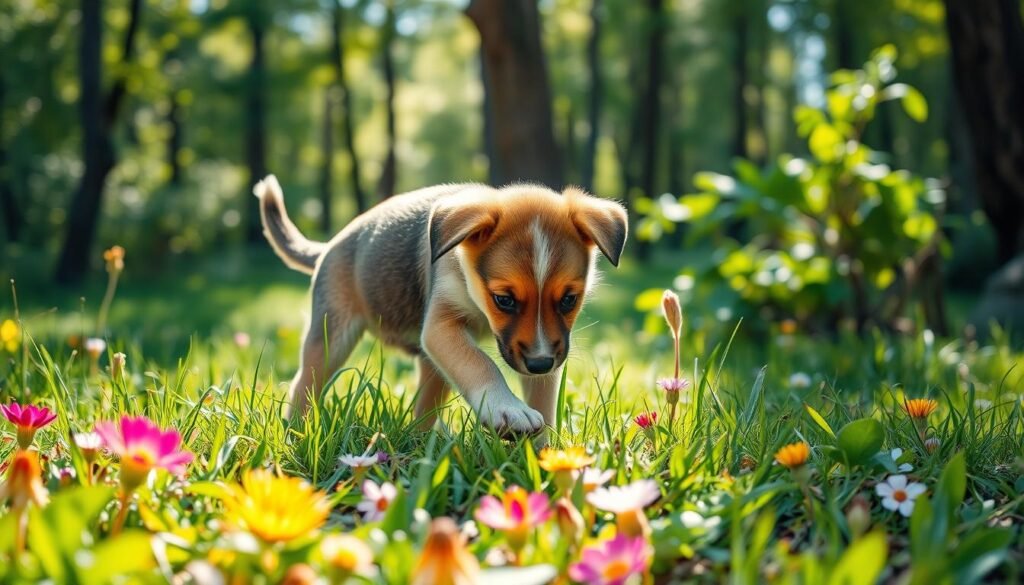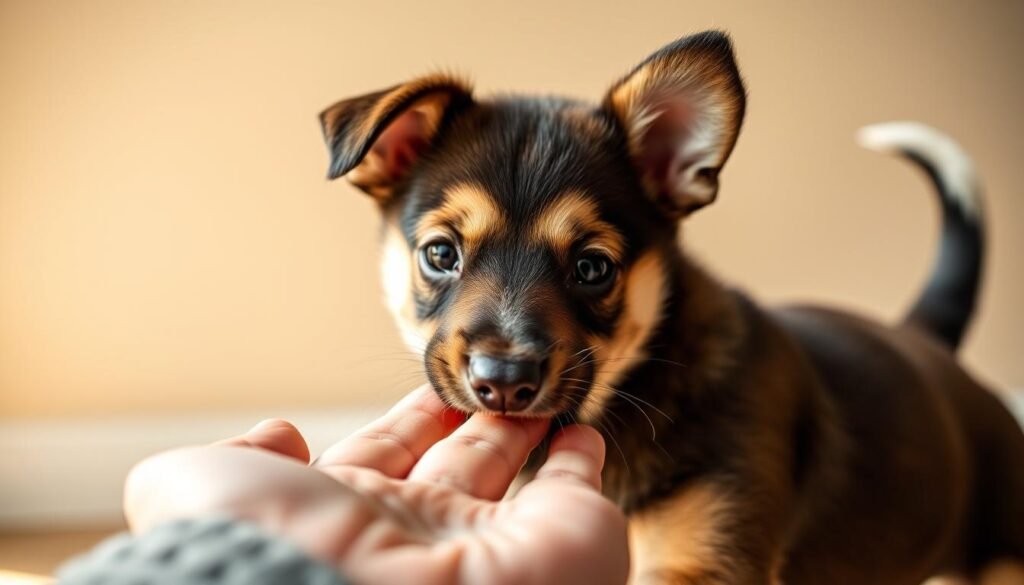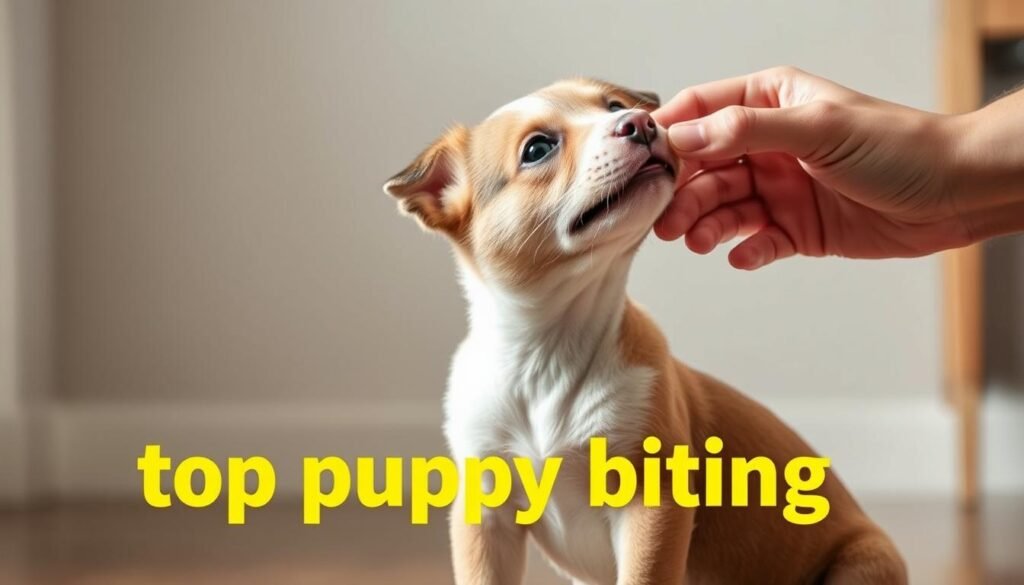I remember bringing home my first puppy. Those tiny razor-sharp teeth were both adorable and challenging. Every new puppy parent faces the surprise of how to stop puppy from biting. Puppies explore their world by mouth, making training a key part of early pet care.
Knowing biting is a natural stage helps pet owners train with patience and compassion. Puppies use their mouths to learn, interact, and test boundaries. While it’s cute when they’re small, it’s important to address biting early to avoid future problems.
Stopping biting needs understanding, consistent training, and positive reinforcement. The right techniques can help your puppy learn good chewing habits. This way, you can build a harmonious relationship.
Key Takeaways
- Puppy biting is a normal part of development
- Early intervention prevents long-term behavioral problems
- Consistent training is crucial for success
- Positive reinforcement works better than punishment
- Understanding your puppy’s teething process helps manage biting
Understanding Normal Puppy Biting Behavior
Puppies are naturally curious and explore their world with their mouths. Biting is key to their learning in early development. Knowing why puppies bite helps owners stop nipping and teach them to bite less.

Why Puppies Use Their Mouths
Puppies use their mouths to understand their environment. This is normal and serves several important purposes:
- Exploring new objects and textures
- Learning about their surroundings
- Releasing excess energy
- Practicing social interactions
Play Biting vs. Aggressive Biting
Not all puppy biting is the same. Play biting is gentle and helps with social development. Aggressive biting is more intense and intentional. Most puppies bite during play to learn about boundaries.
Knowing the difference helps owners respond right and stop puppy nipping effectively.
Natural Teething Process
Teething is a big reason for puppy biting. Most puppies experience intense teething between 3 to 5 months old, lasting until 6 to 7 months. During this time, they chew and bite to find relief.
To manage this, give them chew toys and redirect their biting. This prevents damage to household items.
Teaching Bite Inhibition: The Foundation of Training

Puppy bite inhibition is key for young dogs to control their mouthing. It prevents aggressive behaviors later on. Puppies start learning this skill early, with their littermates and mother. It’s vital for pet owners to know how to teach this to their puppies.
During play, puppies learn about biting from their siblings and mother. If they bite too hard, they get a yelp or are pulled away. This teaches them the right amount of force when mouthing.
- Recognize that biting is a normal developmental behavior
- Mimic natural learning processes used by puppy littermates
- Use consistent training techniques to reinforce gentle mouth behavior
Here are some key strategies for teaching puppy bite inhibition:
- Immediately respond to hard bites with a sharp, high-pitched yelp
- Briefly withdraw attention when biting becomes too intense
- Redirect biting toward appropriate chew toys
Positive reinforcement is important in teaching puppies. Give treats and praise for gentle mouthing or chewing on toys. This makes them associate good chewing with rewards.
Remember, patience and consistency are key when teaching bite inhibition to your young companion.
Think about joining puppy socialization classes. They’re great for learning bite control and social skills. These classes help your puppy practice gentle play and learn important social cues.
How to Stop Puppy from Biting: Essential Training Methods
Dealing with puppy biting can be tough, but the right training can help. It takes patience, consistency, and the right methods.

Redirecting puppy bites is key to managing their natural mouthing. Knowing how to do it can turn those sharp teeth into a chance to learn.
The Yelp Technique
When your puppy bites too hard, say “ow” or “yip” to mimic littermates. This teaches them biting hurts and stops play. Use it often to teach them to bite gently.
- Make a sharp, high-pitched sound when bitten
- Immediately stop playing
- Walk away to show biting ends interaction
Time-Out Strategy
Time-outs teach puppies that biting means no more fun. If they get too mouthy, calmly leave the play area. This shows them gentle play keeps the fun going.
Positive Reinforcement Approaches
Give treats, praise, and calm attention for good behavior. Redirect biting to chew toys. Play non-contact games like fetch to keep their mouth off you.
- Use treats to distract during handling
- Provide puzzle toys for mental stimulation
- Praise calm behavior
Remember, consistency is key in training your puppy to stop biting. If biting doesn’t stop, get help from a professional dog trainer.
Redirecting Puppy Biting to Appropriate Objects
Redirecting puppy biting is key to managing their natural chewing. It’s vital to give them the right things to chew on. Anticipate when they might bite and guide them to safe toys before they do.
Keep a variety of fun toys around. Having many options keeps your puppy interested. Good redirection techniques can turn bad biting into good play.
- Use high-value treats to redirect attention
- Offer toys immediately after a bite attempt
- Employ dramatic verbal corrections like “No” or “Ouch”
Keep a chew bone near when petting your puppy. Start with short sessions and switch hands to keep them calm. Consistency is the most important aspect of bite redirection.
Try creative solutions like a knotted dish towel for tug-of-war. It’s a great alternative to biting hands. Remember, each puppy is different, so try different toys to see what they like.
Managing Puppy Teething and Discomfort
Puppy teething can be tough for pets and their owners. Knowing what’s happening helps pet parents find good ways to help their puppies. They can also learn how to stop puppies from biting and support their growth.
Puppies go through big changes in their teeth early on. They start getting their first teeth at 5-6 weeks and lose baby teeth at 16 weeks. By 6-7 months, they have all 42 adult teeth.
Understanding Teething Phases
Each teething phase has its own challenges for stopping puppy bites. Puppies feel a lot of pain and want to chew and bite a lot during these times.
- Early teething (5-8 weeks): Initial tooth emergence
- Transitional phase (8-16 weeks): Baby teeth falling out
- Adult teeth development (16-32 weeks): Complete tooth replacement
Soothing Teething Discomfort
There are smart ways to ease your puppy’s teething pain. Here are some good ideas:
- Freeze dog-friendly toys like Kongs or rubber bones
- Offer frozen dog-safe fruits and vegetables
- Use specialized teething bones that fit your puppy’s breed
If your puppy bites, say “OW” loudly and quickly give them a chew toy. Praise them when they’re calm to teach them good behavior.
Remember, patience and consistent training are key to successfully managing your puppy’s teething journey.
Prevention Strategies for Excessive Biting
To stop puppies from biting too much, we need a smart plan. This plan should help them not chew on things they shouldn’t. It’s about keeping them busy and happy.
- Make your home safe by taking away things they shouldn’t chew
- Give them lots of fun toys to play with
- Make sure they get enough exercise to burn off energy
- Use positive methods to teach them during training
Exercise is very important for puppies. Structured play sessions help them not bite as much. Give them 5 minutes of play for every month of age, twice a day. This helps them use their energy in good ways.
Being consistent is key in teaching puppies not to bite. Every time you interact with them, you’re teaching them right behavior.
Mental games are also key. Teach them commands like “leave it” to learn what’s okay and what’s not. When they focus on the right toys and stay calm, reward them. This teaches them good habits.
| Prevention Strategy | Key Benefits |
|---|---|
| Toy Rotation | Keeps puppies interested and stops boredom |
| Consistent Training | Teaches them what’s right and wrong |
| Regular Exercise | Helps them not get too energetic or frustrated |
Remember, stopping puppies from biting is not about punishing them. It’s about being patient and teaching them the right way.
Common Mistakes to Avoid When Training
Training your puppy to stop biting needs careful planning and the right approach. Many owners make mistakes that make it harder to manage biting and help with behavior. These mistakes can slow down your puppy’s learning.
Dealing with puppy training can be tough. Knowing the common mistakes helps avoid setbacks in stopping unwanted biting.
Physical Punishment Risks
Using physical punishment to stop biting is never right. It can hurt the trust between you and your puppy. This can even make them more aggressive. Losing your cool or using harsh methods can really hurt a young dog. It makes training much harder.
Inconsistent Training Problems
Being consistent is key in managing puppy biting. If training methods change too much, it confuses puppies. This makes it hard for them to learn not to bite. Setting clear rules and sticking to them helps puppies know what’s expected.
- Establish clear rules from the start
- Ensure all family members follow the same training approach
- Use consistent verbal cues and responses
Inappropriate Play Behaviors
Some play styles can actually encourage biting. Always play with a toy to teach your puppy that biting people is wrong. Use the “Three Strikes, You’re Out” rule to teach boundaries:
- Say “Ouch!” and stop play momentarily
- If it happens again, say “Ouch!” and turn away
- If it continues, end playtime or use a timeout
Remember, patience and consistent positive reinforcement are key to successful puppy biting training.
If your puppy keeps biting and you don’t get help, it can get worse. Professional trainers can give you specific advice for your puppy’s needs.
Creating a Bite-Free Environment
Creating a bite-free environment is key for managing puppy bites. Puppies learn by mouthing things, so a well-planned space can help cut down on biting.
To train puppies to not bite, I use several strategies:
- Give them lots of chew toys to keep their mouths busy
- Change toys often to keep them interested
- Set up play areas with safe toys for chewing
Exercise is also vital in managing puppy bites. I suggest activities that keep them active and focused. Aim for 5 minutes of play per month of age, twice a day. Games like fetch or tug-of-war can help reduce biting.
Training is another important part of managing puppy bites. Use treats to reward good behavior and teach commands that stop biting. The “leave it” command is great for teaching what not to bite.
If biting happens, take a short break of 5-10 minutes. This shows your puppy that biting means no playtime. Most puppies grow out of biting by 6-8 months.
Consistency across all family members is key to successful puppy bite-free training.
If biting continues, consider getting professional help. Every puppy is different, and a pro can offer valuable advice.
Conclusion
Stopping a puppy from biting needs dedication and understanding. Each puppy is different, but with the right training, owners can handle this stage. Patience is key in managing puppy bites, turning tough moments into good ones.
Managing puppy biting involves many steps. Knowing why puppies bite, like during teething, helps owners train them better. Giving them the right toys and using positive methods can cut down on biting.
If problems don’t go away, getting help from experts is a good idea. Some puppies need extra help to stop biting. Vets and dog trainers can offer special plans for each puppy, helping them grow into well-behaved dogs.
At the end, it’s all about a strong bond between the puppy and its owner. With patience, love, and the right training, puppies can grow into dogs that communicate well without biting.
FAQ
Why do puppies bite so much?
Puppies bite as a natural part of growing up. They use their mouths to explore, play, and during teething. It’s a normal way for them to learn about their world.
They bite to check out objects, play, and to ease teething pain.
Is puppy biting a sign of aggression?
Usually, puppy biting isn’t aggressive. It’s a way for them to learn and interact. Playful nipping is different from aggressive biting.
If the biting is intense or doesn’t stop, it’s wise to get help from a dog trainer.
At what age do puppies stop biting?
Puppies start to bite less around 4-6 months. This is when they learn to control their bites and finish teething. But, training is key to teach them right behavior.
Most puppies will get better with training and socialization.
How can I teach my puppy bite inhibition?
Teaching bite inhibition involves several steps: – Use the yelp method when they bite too hard – Give time-outs for too much biting – Offer the right chew toys – Redirect their bites to safe objects – Reward them for gentle behavior
What are the best chew toys for teething puppies?
Choose chew toys made for puppies. They should be: – Durable and safe – The right size for your puppy – Soothe teething pain – Textured for gum massage – Freezable for extra relief Good options include rubber toys, frozen washcloths, and special puppy chew toys.
How long does puppy teething last?
Teething in puppies lasts from 3 to 6 months. They lose baby teeth and grow adult ones. The worst teething is usually between 4-5 months.
What should I avoid when trying to stop puppy biting?
Don’t make these mistakes: – Don’t physically punish or hit them – Avoid rough play that encourages biting – Use consistent training methods – Don’t use hands as toys – Avoid yelling or extreme anger – Don’t ignore the behavior
When should I be concerned about my puppy’s biting?
Get help if you see: – Bites that break skin often – Aggressive body language with bites – Biting that doesn’t get better with training – Signs of fear or anxiety – Bites that are too intense or happen a lot

